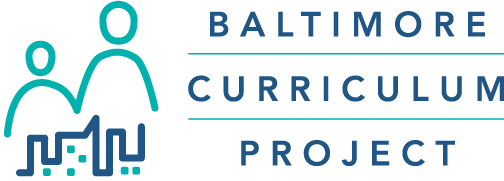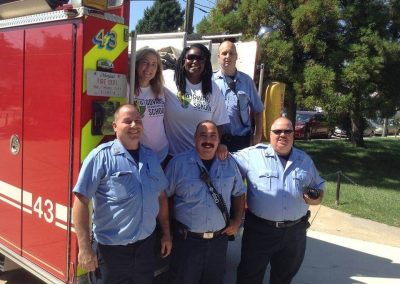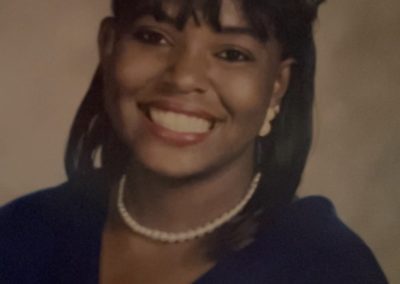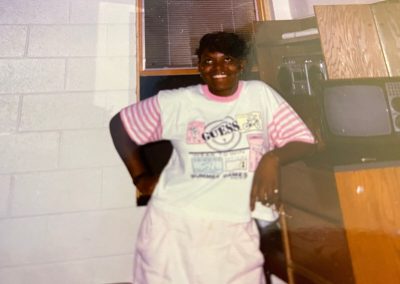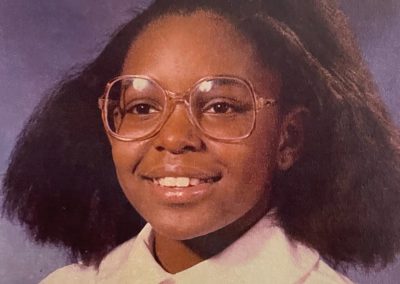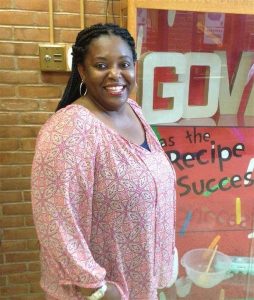 Bernarda Kwaw holds a unique record at Baltimore Curriculum Project (BCP). She has held every role, except student, within BCP. Over her 30 year career, she’s been a BCP classroom teacher, academic coach, parent of Hampstead Hill Academy student, BCP Board member, Assistant Principal, and since 2018, Principal of Govans Elementary School.
Bernarda Kwaw holds a unique record at Baltimore Curriculum Project (BCP). She has held every role, except student, within BCP. Over her 30 year career, she’s been a BCP classroom teacher, academic coach, parent of Hampstead Hill Academy student, BCP Board member, Assistant Principal, and since 2018, Principal of Govans Elementary School.
During Black History Month, it is our pleasure and privilege to honor Ms. Kwaw, one of our exceptional leaders of color, with a look at her impressive BCP career and journey – in her inspiring words.
How did your teaching career begin?
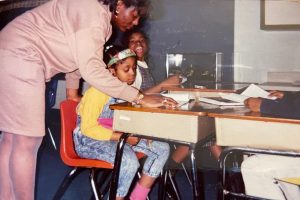 I initially thought I wanted to be a nurse because my grandmother and mother were nurses, but I soon realized that I had a very low tolerance for other people’s pain and blood. During summers in high school, I worked at camps and realized I really liked working with children. I have a younger sister who has Down syndrome, so I often worked with her teaching her sign language to some degree. It really excited me to see someone learn something.
I initially thought I wanted to be a nurse because my grandmother and mother were nurses, but I soon realized that I had a very low tolerance for other people’s pain and blood. During summers in high school, I worked at camps and realized I really liked working with children. I have a younger sister who has Down syndrome, so I often worked with her teaching her sign language to some degree. It really excited me to see someone learn something.
I began my teaching career in 1993 at Collington Square Elementary in Baltimore. I taught grades first through fourth, over my 14 years as a classroom teacher.
When I arrived at Collington Square [in 1993], it was a traditional Baltimore City School, but in 2008, it became a BCP neighborhood conversion charter school. I love the autonomy of teaching at a BCP school. I love Direct Instruction. It’s a program that’s already created and built, that I could make it my own and focus on the students, their learning, and how to patch any holes in their learning.
What was your evolution from classroom teacher into academic coach?
I was hesitant to become an academic coach. I believe that just because you’re a good teacher, it doesn’t necessarily mean that you’re able to lead other adults. Children have always been my best audience, so I was a little hesitant, but then someone shared with me the impact that I could have if I were able to work with other teachers. Being a classroom teacher, I only impacted the 25 or 30 children in my class. Being an academic coach and working with five teachers or more, I’m having an impact on the children in each of the classrooms of those teachers.
What makes the academic coaching role so important and unique to BCP schools?
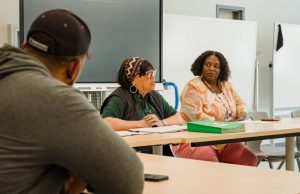 When you teach at a BCP school, one of the biggest benefits is that you’re professionally developed based specifically on your needs. You get an opportunity to say where you need growth, what areas you need support in, and you get it. BCP creates professional development sessions and aligns you with people who possess those skills that you desire to grow. It’s highly individualized.
When you teach at a BCP school, one of the biggest benefits is that you’re professionally developed based specifically on your needs. You get an opportunity to say where you need growth, what areas you need support in, and you get it. BCP creates professional development sessions and aligns you with people who possess those skills that you desire to grow. It’s highly individualized.
Prior to BCP coming to Collington, we had a master teacher who worked with every teacher in the building. She and I developed a relationship, and she would dedicate an evening each week where she helped me work through lessons. But that was the exception. At BCP, every teacher has a coach that works with your particular grade level or your team, and you have consultants that came from other states who wrote the curriculum and have seen other people teach and coach. You are working with experts, people who can really relate to any kind of concerns or issues that you might be having and can give you reasonable, actionable support and feedback.
How did you evolve from academic coach to assistant principal?
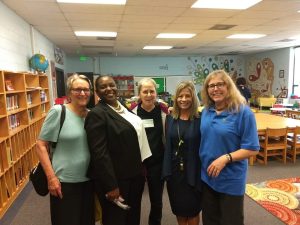 I was quite happy being an academic coach, but BCP encouraged me to apply for the assistant principal position at Collington Square. BCP provided me with a mentor, who I am friends with to this day. Several times a week she sat with me, we went over my day and any issues I was having. We celebrated any achievements that had happened. It was just incredibly helpful.
I was quite happy being an academic coach, but BCP encouraged me to apply for the assistant principal position at Collington Square. BCP provided me with a mentor, who I am friends with to this day. Several times a week she sat with me, we went over my day and any issues I was having. We celebrated any achievements that had happened. It was just incredibly helpful.
I stayed on as the assistant principal at Collington Square after it transitioned back to a traditional school, but missed the support, autonomy, and Direct Instruction curriculum that BCP offers. John McGill [Former Director of Academic Affairs for BCP] and I had stayed in touch, and I learned of the opening at Govans for an assistant principal. I interviewed with Linda Taylor, who was Principal of Govans at the time, and she hired me.
Tell us about your path to becoming principal.
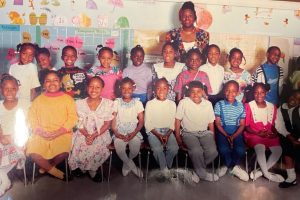 Two years into being the assistant principal at Govans, Ms. Taylor announced that she was retiring. She talked to me about possibly becoming the principal. I was hesitant again, mostly because my children were in high school and middle school, and I worried about being able to give them enough attention and support that they needed.
Two years into being the assistant principal at Govans, Ms. Taylor announced that she was retiring. She talked to me about possibly becoming the principal. I was hesitant again, mostly because my children were in high school and middle school, and I worried about being able to give them enough attention and support that they needed.
But I also have had the experience of being under leadership that was not aligned with my ideas, and it is very, very challenging. I thought, what better way to make sure that everyone’s on the same page than to be the principal, what a great opportunity to lead a school.
At that point, I was able to hire Ms. Jennings as the Assistant Principal, someone whose work ethic I knew and whose focus and mission and vision were very much aligned with mine. To be honest, my goal wasn’t to even be an administrator. But things just happened and the right bus in the right seat just arrived.
You are a mom of four. Why was it important for you to send your children to a BCP school?
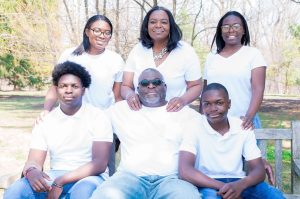 First, I believed in the curriculum. I knew inside and out what it could produce, the foundation that it provides for reading. I knew that it was something I wanted my children to be a part of, and I knew that it would help them be successful.
First, I believed in the curriculum. I knew inside and out what it could produce, the foundation that it provides for reading. I knew that it was something I wanted my children to be a part of, and I knew that it would help them be successful.
All four went to Hampstead Hill and they absolutely loved it. The school prepared them academically, instilled them with confidence, and they created fantastic friendships. They also speak highly of Mr. Hornbeck [HHA Principal]. During their time there, if they had an issue or a problem or concern, they thought nothing of reaching out to him. Even if they may have talked to a teacher first, it made me feel good that they felt he was accessible and attentive to whatever their concerns were.
His example inspired me when I became Principal at Govans. I recall times when my youngest children had conflicts at HHA that required a conference with other families. Mr. Hornbeck facilitated the conference and made sure that everyone had a voice and that the expectations were clear moving forward. He felt it was important to bring families together and hold everyone accountable. I try to do the same as I lead.
What are your children doing now?
After HHA, Kofi and Zion went to Archbishop Curley, Azaria spent one year at Poly and then went on to Chesapeake where her father teaches, and my youngest daughter spent her four years at Western High School.
My oldest daughter, Azaria, 22, is in her final semesters, finishing this spring or summer, at Morgan State University. Kofi W. – my husband is Kofi N. – is 20 and at Elizabeth City University in North Carolina. My twins Zaniah and Zion, 19, both spent their freshman semester at Frostburg State University. Zion has continued at Frostburg, while Zaniah wanted to attend a Historically Black College and University. Since Morgan State University was not able to accept a spring transfer, she is currently taking classes at Baltimore City Community College and will enroll this fall at Morgan.
When did you serve on the BCP board and how did you get involved?
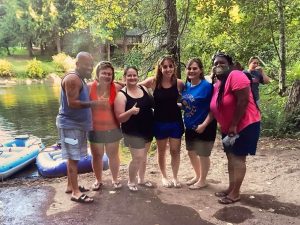 Laura [Doherty, BCP President and CEO] and John McGill, Former Director of Academic Affairs, reached out to me in 2014. I was a little hesitant at the time because I had four elementary age children at home and I was working at a high-need school. I was worried that I couldn’t take care of my responsibilities as a board member, but they assured me that my role would be an opportunity to give feedback, share ideas and support in ways that would not significantly impact the other roles in my life.
Laura [Doherty, BCP President and CEO] and John McGill, Former Director of Academic Affairs, reached out to me in 2014. I was a little hesitant at the time because I had four elementary age children at home and I was working at a high-need school. I was worried that I couldn’t take care of my responsibilities as a board member, but they assured me that my role would be an opportunity to give feedback, share ideas and support in ways that would not significantly impact the other roles in my life.
My time on the board showed me a completely different perspective of what was happening at other BCP schools. I learned a lot more about money management and how to be fiscally responsible. Serving on the board gave me a better understanding and appreciation for what BCP brings to the table for each of the schools. At that point, I’d only seen the traditional school and the district’s take on managing a school. My time on the BCP board reinforced my appreciation for the autonomy that BCP provides for each of their schools.
How have all of your past experiences inspired your work as a principal?
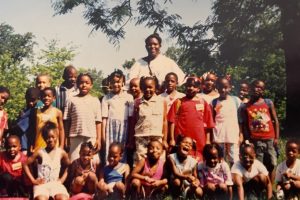 With each season, I’ve gained an understanding of the people in that season. For example, being a mother of two, that was kind of where I wanted to be. Twins were not what I expected, and believe it or not, it gave me a whole different understanding of mothers and parents of multiple children. I planned for two, four came, and it was challenging with four children, age three and under. A lot of our parents at Collington had multiple children, and my experience gave me an entirely new respect for having multiple children.
With each season, I’ve gained an understanding of the people in that season. For example, being a mother of two, that was kind of where I wanted to be. Twins were not what I expected, and believe it or not, it gave me a whole different understanding of mothers and parents of multiple children. I planned for two, four came, and it was challenging with four children, age three and under. A lot of our parents at Collington had multiple children, and my experience gave me an entirely new respect for having multiple children.
Being a teacher gave me a whole new respect for trying to help a child learn a skill, apply that skill, and move forward. Same as with being an academic coach, I understood what it was like to be a teacher, the challenges, the joys.This helped me better prepare other teachers for teaching.
When I was an assistant principal, I felt like my job was to support the coaches that support the teachers. Again, it helps when the people that you’re supporting know that you’ve been in their place. I think that they have a different respect for any support or advice or feedback that you might give them.
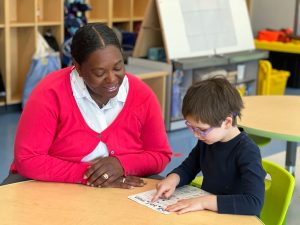 The same is true for being a principal. I understood the role as assistant principal, the highs, the lows, everything that comes with it. The pieces of my life, including being a board member, gave me an entirely different respect for the role principals play in schools. Every season helped to prepare for that next step.
The same is true for being a principal. I understood the role as assistant principal, the highs, the lows, everything that comes with it. The pieces of my life, including being a board member, gave me an entirely different respect for the role principals play in schools. Every season helped to prepare for that next step.
Also, having a sibling with special needs influenced my career. My younger sister was born when I was 16, so I did a lot to care for her. Even when she went on to start school, the school oftentimes would call me at work to help me encourage her. I had teaching tools and techniques that I could then impart with my mother and then implement with my sister and even share with her teachers and the people that work with her.
What advice would you have for a teacher today who aspires to be a principal?
My advice would be to spend as much time getting to know all the pieces of teaching – teach different grade levels, exploring different committees in the school or within the community – just get to know as many different perspectives as possible. I really believe a huge part of what I do is about relationship building. When you can communicate to people that you understand where they are, that you’re knowledgeable about a specific area, that helps to build that communication and relationship. Once you’ve built those relationships, it’s a lot easier to talk to parents and children and to guide them.
What is it about being in education that still inspires you?
For me, it goes back to the impact that you have on children’s lives. Nothing can replace the feeling that you get when you know you’ve played a part in someone learning how to read, learning how to do math, someone, learning how to resolve a conflict peacefully, or helping a parent better understand how to support their child. There’s nothing like it.
Bernarda Kwaw’s Bio:
- Principal Kwaw earned her bachelor’s degree in education at Cheyney University of Pennsylvania (1993) and her Master’s in educational administration at Morgan State University (1996).
- Teacher at Collington Square, 1993- 2007
- Academic Coach at Collington Square, 2007-2010
- Assistant Principal at Collington Square, 2010-2015
- BCP Board Member, 2014-2015
- Assistant Principal at Govans Elementary, 2015-2018
- Principal of Govans Elementary, 2018-present
